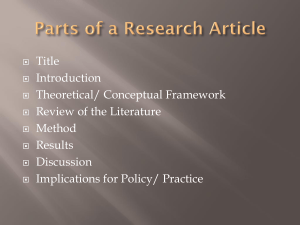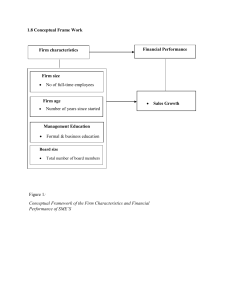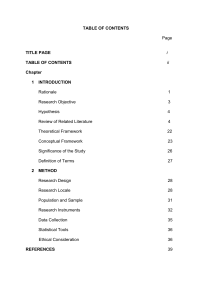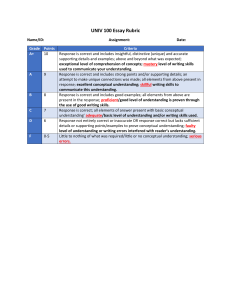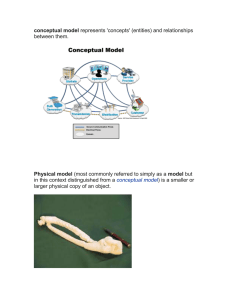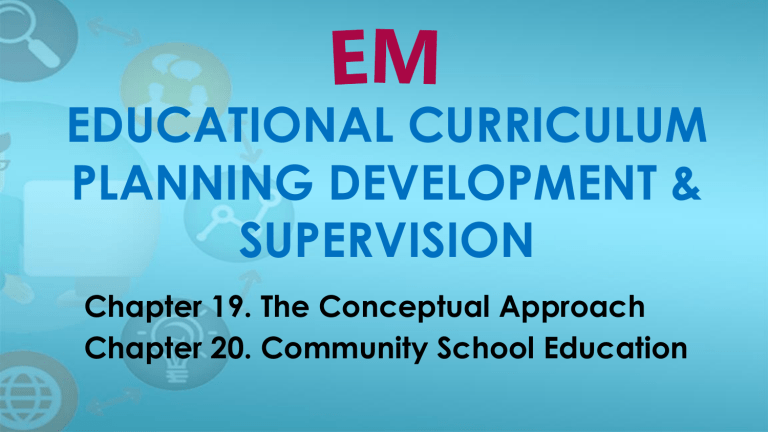
EDUCATIONAL CURRICULUM PLANNING DEVELOPMENT & SUPERVISION Chapter 19. The Conceptual Approach Chapter 20. Community School Education THE CONCEPTUAL APPROACH The Conceptual Approach may be considered either as a way of organizing the curriculum or a way of developing concepts through scientific inquiry. Conceptual Approach is a method of organizing the curriculum around basic concepts and generalization. Concept is the categorization or classification of things, events, or ideas. THINGS TO CONSIDER… We should not expect the learner to instantly grasp a concept. He should first be led into learning such concept in a hierarchical and developmental pattern. We should start with specific facts which, when connected and interrelated, may be used to form concepts with low level of abstraction. The process of conceptualizing is subjective; it is personal to the learner. THINGS TO CONSIDER… It is something only the conceptualizer or learner can do. It is not memorizing what someone else thinks a specific concept is. Conceptualizing means examining and reflecting on similar experiences in order to identify their common elements and build an orderly image of them. The conceptual approach aims at developing a thinkingfeeling-acting man. Structure is the foundational concepts and generalizations of a discipline. “Every minute 2,000 pages of books, newspaper, or reports are published somewhere in the world” – Paul Todd It is important that instruction is focused on the fundamental ideas or on the concepts and generalizations of each major branch of knowledge. EXAMPLE: Generalization: “Natural resources are indispensable for the development and progress of a nation.” Concept: Natural Resources, Development, Progress, Nation Subconcept: Trees, Land, Minerals, Water The strategy preferred in the conceptual approach may be generally described as inquiry which is mainly premised on the idea that due to the fast ‘turnover’ of knowledge, it is better to stress the ‘how to learn’ rather than ‘what to learn.’ The experiential method in the conceptual approach is based on the three basic educational principles, as stated by Pine and Horne. Learning is change as a result of an experience which is personally meaningful and relevant to the individual. Learning is both an intellectual and an emotional process. Learning is a cooperative and collaborative process. “Learning is discovery. There is no other means of effective learning. You can tell a child a thousand times that the stove is hot. It doesn’t help. The child has to discover for himself.” – Fritz Perls COMMUNITY SCHOOL EDUCATION The movement to community school education stems from a variety of concerns about the learners and societal structures. The Nature of Community School Education “Community education as a process that puts meaning into the notion that people can and should make an input into the educational system that serves their community.” – Kerensky 1972 “The underlying premise of the community school to be belief that the schools belong to the people, and that local resources can be harnessed to attack community problems.” – Hughes School may serve a four-fold role as follows: An educational center where learner and adults have optimum opportunities for study and learning. A neighborhood center for cultural and recreational activities. A center for social services. A center of neighborhood and community life assisting citizens in the study and solution of neighborhood problems. Community Education and Community Schools Community Education is a concept based process of education for children, youth, adults. Community Schools are vehicles that provides opportunities for community involvement and decisionmaking. END GAME
